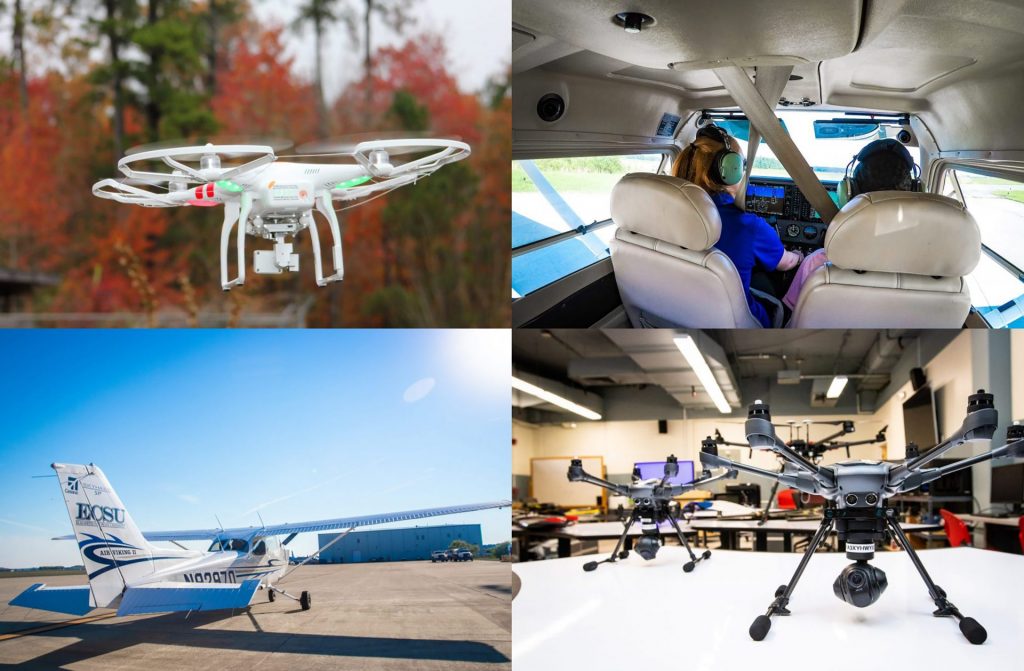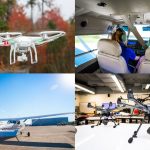As ECSU’s Enrollment Continues to Climb, Aviation Science’s Popularity Soars

Elizabeth City State University enrollment has climbed for the fifth straight year and along with it, Aviation Science is one of the top choices for majors by incoming freshmen.
Aviation Science is soaring in popularity on campus not only because of an increased demand in the career field, or the affordable cost of obtaining the only four-year aviation degree in North Carolina, but also because it is gaining national prominence, says the dean of the School of Science, Aviation, Health and Technology, Dr. Kuldeep Rawat.
According to Dr. Rawat, the program currently has 153 students, of which 111 are enrolled in flight education. Last fall, the total number of students was 127, making this fall’s climb a 20.47 percent increase, he said.
“We also have 14 new transfer students and that can be attributed to our articulation agreements we have done with community colleges,” said Dr. Rawat.
In 2019, ECSU signed agreements with Guilford Technical Community College, Lenoir Community College, and Sandhill Community College to bring their aviation students to the university. The transfer students complete their first two years at their respective community colleges before completing their degree at ECSU.
But transfer students are only one part of the equation. Dr. Rawat credits a year-round outreach strategy, a strong social media presence – many future students are responding to social media outreach, he says – and the fact that ECSU is offering a competitive, quality aviation program at a very affordable price.
The program is a Federal Aviation Administration approved PART 141 flight school and authorized for Restricted Airline Transport Pilot (R-ATP). That means ECSU’s program offers a more structured environment for future pilots, and students will have a shorter flight-training period.
“The 141 designation reduces the flight training degree requirement from 250 hours to 190 hours,” said Dr. Rawat. “This will save students 60 hours of flight time and reduce their flight training cost significantly.”
In addition, he said, graduates from ECSU’s Aviation degree program need only a total of 1000 hours of flight time compared to the previously required 1,500 hours.
Aviation students are able to earn their private, commercial pilot, and flight instructor licenses. ECSU has 12 planes in its aviation stable, and 10 flight instructors.
“Students do flight training twice a week at a minimum to keep them on track for their FAA certification,” says Dr. Rawat.
Aviation education costs can be high, but ECSU is considered one of the most affordable programs in the country, allowing future military and commercial pilots the opportunity to earn a bachelor’s degree while preparing for the next step in their aviation careers.
Last month, ECSU entered into an exclusive partnership with United Airlines Aviate pilot training program. United Airlines is committed to recruiting 5,000 new pilots, half of which will be women and people of color, according to airline officials, to address a growing shortage of pilots in the industry.
Thanks to this partnership, aviation students now have a direct career pipeline to a major commercial airline after graduation from ECSU.
For aviation students with a desire to be military pilots, the university also works with the Coast Guard’s College Student Pre-Commissioning Initiative, or CSPI, to prepare future officers, many of which go on to become helicopter or C-130 pilots.
The aviation industry as a whole is a growing career path for many students, and not all students are driven to become pilots. Some will focus on aviation management, while others may enter the field of avionics. And some aviation science students will either pursue a specific degree in unmanned aerial systems, or drones, or make it a concentration within aviation science.
Dr. Rawat says that the drone program is approved as part of the FAA Collegiate Training Initiative, or CTI, program.


